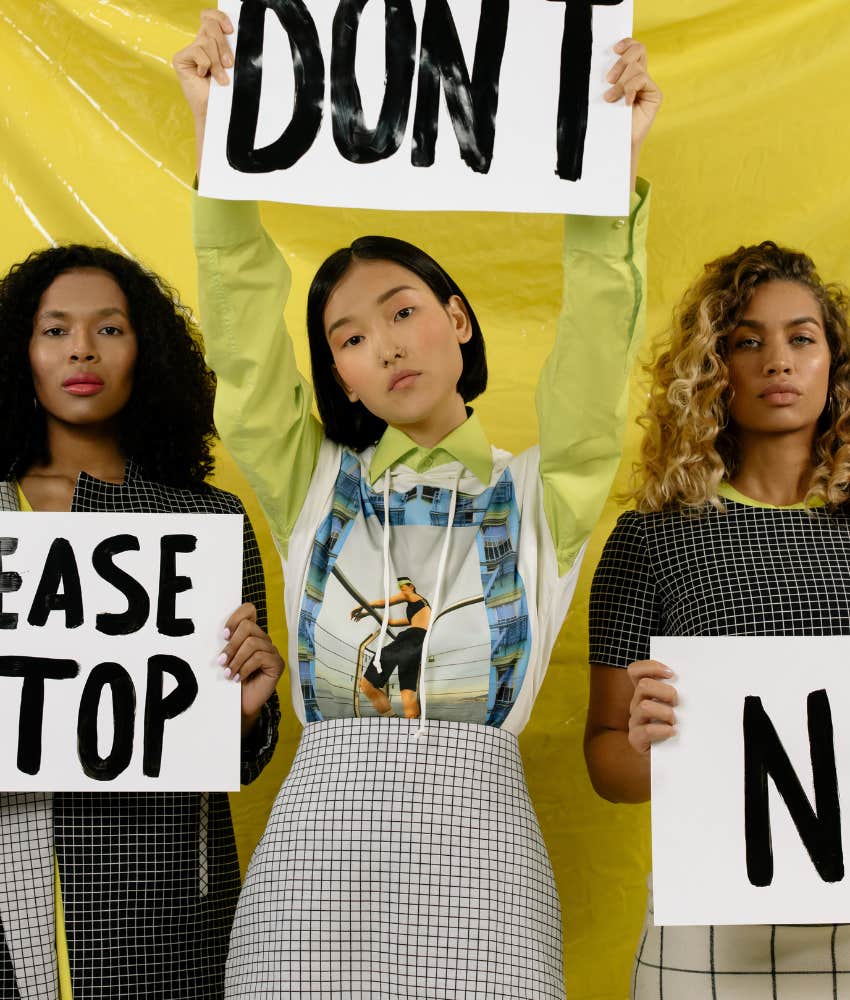11 Unique Traits Of A Zillennial That Completely Separate Them From Other Generations
Zillennials are unique in their own way.
 PeopleImages.com - Yuri A | Shutterstock
PeopleImages.com - Yuri A | Shutterstock Ever feel like you don't quite fit in when it comes to generational stereotypes? It might be because you're actually one of those unique individuals born on the cusp. Case in point: zillennials. They're not quite millennials and not quite Gen Z, but they are completely unique in their own right.
The term millennial (also known as Generation Y) refers to anyone born between 1981 and 1996, and Gen Z refers to anyone born from 1997 through 2012, according to the Pew Research Center. Though there is no consistent cutoff point that experts agree on. Zillennials are typically considered to be 1993-1998, the last three years of the millennials and the first three years of Gen-Z. Though this can mean that zillennials are a mixture of both generations, it also makes them their own generation entirely. "Millennials might see zillenials as a bit too Gen Z-ish, while Gen Z might think they’re too old-fashioned," says Ojaswita Paul in an article for Medium.
1. Growing up with cell phones but NOT smart phones
Millennials are likely to remember using a home phone or a landline to call their buddies growing up. Though the first cell phone came out in the '80s, they were not at all commonplace until the early 2000s, with the advent of 3G in 2002. This means millennials likely didn't get their first cell phone until they were already in their 20s.
Zillennials, however, may have gotten their first cellphone in middle school or early high school, but by the time they entered college, they had a smartphone (which grew in popularity in the 2010s). "At best, Early Z can remember before they blew up in the early 10’s, but ultimately most Z weren’t yet cognizant in 07 when they came out," says a Reddit user in the Generationology subreddit. "In other words, they remember what the dial-up connection tone sounded like but went to university with a tablet in hand," according to an article on Knockri.
2. Using the internet mostly for games
Long before the creation of apps, or even social media. The internet was a place reserved for games. Disney Channel's website used to have games for almost every popular TV show, such as "The Suite Life of Zack and Cody" and "Kim Possible."
When we snuck onto the internet during typing class — and yes, we really did have typing class — it was to log in to Webkinz and play games. I have memories of calling my friends on the landline after school and asking if I could visit their house, and I didn't mean in person; I meant on Club Penguin. When Facebook did come around, the only part zillennials were addicted to was checking their Farmville.
3. Job hopping
 Pranithan Chorruangsak | Canva Pro
Pranithan Chorruangsak | Canva Pro
Zillennials have a unique approach to work. Unlike the Gen Xers and the millennials before them, they are more likely to switch jobs for better pay or benefits. According to Knockri, "Fifty-three percent of Zillennials say that working an unfulfilling job is their primary source of stress. One in four says they’ve considered leaving their position for a better benefits package elsewhere in the past year. Employee experience isn’t just a 9-to-5 box to check: Zillennials want a holistic experience that considers them people, not just workers."
This aligns with a report by GWI that found 39% of zillennials say they might look for a different job in the next 6 months, compared to 28% for older generations. This isn't about a lack of commitment, but rather a focus on growth and furthering opportunities.
4. Graduating from college into a pandemic
Unlike Gen-Zs who were in early college or even younger when the pandemic hit, and unlike the older millennials before them, zillennials either had just graduated when COVID-19 made things hit pause, or had to finish the very last of their degree via Zoom.
Unlike Gen-Z, they had a taste of adult life, living alone and going out on the town, even though their workplace was like pre-pandemic. Zillennials remember what it was like to be in the office every day, but also might be more familiar with video meetings than their older millennial counterparts.
5. More open about mental health struggles
According to a study by Leger 360, 51% of millennials and 44% of Gen-Z experience depression. The Guardian attributes a lot of this anxiety to social media. They argue that social media not only exposes zillennials to more global issues and negative news but also puts pressure on them to curate and share their life in a way that their peers approve of. Zillennials are so stressed about finances and work that they've even been dubbed the "burnout generation."
The positive is that zillennials are much more upfront about their mental health struggles. This helps to move away from the stigmas around therapy and medication that we've seen in other generations. They are also more likely to seek jobs that have healthcare benefits, which can allow them to afford things like counseling.
6. Prioritizing social activism
 cottonbro studio | Canva Pro
cottonbro studio | Canva Pro
"Zillennials have leveraged social media to amplify social and political issues, sparking and supporting various social movements and awareness campaigns," noted Medium.
Key issues and interests include equality, LGBTQ+ issues, sustainability, mental health, and politics. For employees, they look for jobs that include, or at least address, these issues. Knockri said that "having a clear stance on the environment and implementing diversity, equity, and inclusion" are two of the top things zillennials look for in a workplace.
Pion offers some background as to why social activism is so important to zillennials, "Their childhood was dominated by political and economic issues, such as 9/11 and the financial crisis of 2007/8. The fallout of these global events may or may not have directly affected them. But as social media brought world issues to their fingertips, they became the first of a new type of activist — one that uses online platforms as a springboard for change."
7. Desire to travel
Zillennials are keen to travel, which could likely have something to do with their inability to travel during the pandemic. A survey in 2023 of zillennials in England revealed that 26% of them plan to spend thousands on a big trip abroad. According to a 2024 study by GWI, 34% of Gen-Z plan to travel more in the New Year. 26% of millennials are planning to book a vacation within the next 6 months.
American Express’ “2025 Global Travel Trends Report” unveiled four major consumer travel trends. These trends are “Memorable Mementos,” “Fam Adventures,” “Benefit Aficionados,” and “Tap In, Take Off.”
8. Body positivity
Similar to zillennials' focus on well-being, they are less concerned with losing weight than they are with their overall health. For Gen-Z, the '90s skinny trend may be back, but for zillennials, they're still all about body positivity.
In that same GWI study, they found that improving fitness overtook weight loss as the main motivator for dietary choices, with over half of zillennials describing themselves as health-conscious.
9. Sustainability
According to Forbes, "84% of Gen Z shoppers and 73% of millennials (of which zillennials are the middle subset) choose to spend more on sustainably produced and ethically sourced goods."
We've also seen a large uptick in shopping trends like thrifting and upcycling clothing, which is the process of making something new out of old clothing. According to ThredUp’s 2024 Resale Report, the global secondhand market is expected to grow to $350 billion by 2028. One of the most budget-friendly and easiest ways to shop sustainably is by buying what you can second-hand.
10. They're nostalgic
 Tima Miroshnichenko | Canva Pro
Tima Miroshnichenko | Canva Pro
"From ‘90s playlists to family movie nights, millennials have a soft spot for the past. 43% say they enjoy listening to ‘90s music, and they’re 17% more likely to prefer family or kids films compared to the average person," says GWI.
Elle suggested that the reason the '90s are the main culprit behind nostalgia is due to the ''30-year theory." Writing, "Our focus on the nineties can partly be put down to the 30-year theory around nostalgia, which dictates that things start to look interesting rather than just old-fashioned after three decades."
We've also seen that it's not just the '90s zillennials are nostalgic for, but a variety of decades. Part of this can be explained by the "micro" trends we've seen. This means not only are the '90s back, but so are the '80s, '70s, '60s, and early 2000s.
11. Using social media for communication
Social media was originally made with connectivity in mind, but the concept seems to have devolved from that in recent years. Instead, it became a place filled with ads and influencers, and connectivity fell by the wayside. However, between 2020 and 2024, the number of zillennials who said they used the platform for messaging friends and family rose by 82%, according to GWI.
Alexis Faible is a writer with a Bachelor's in fashion design and a Master's in journalism covering fashion, relationships, and human-interest stories.

